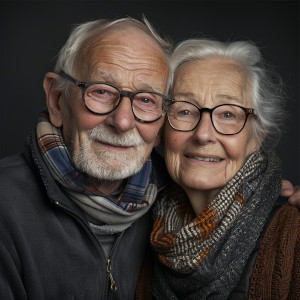Seniors in every family begin to need help at some point in their lives. This is a natural stage where care and support become invaluable. If your family has just come up with such a need, you’ve come to the right place. 24-hour care for senior citizens at home, where proximity to home and familiar surroundings promote a sense of security, is an excellent solution for most seniors. In this guide, you’ll find out why such a choice can be a hit and whether it’s the perfect solution for your family.
Table of contents
- How to find home care for a senior resident?
- What is Senior Care?
- What activities do a caregiver for an elderly person with a residence do?
- How much does a 24-hour care service cost for a senior citizen?
- What qualifications does an elderly caregiver have?

How to find home care for a senior resident?
Home care is a support model increasingly chosen by families. The list of certified care agencies is available on Hrily Care Service. If you are looking for care for an elderly person with a residence, this is the platform for you. There are profiles of caregivers for older people you can work with. Career profiles include the range of activities they can undertake, references, certificates and courses, and a description of their experience in caring for the elderly. Most agencies also indicate the date of arrival of the guardian, and this is often very short. It is not uncommon for an elderly person’s caregiver to be on-site, even within two days. In addition, you can check the rates for care of seniors and the availability of caregivers for the elderly. Working with a residence is an excellent proposition for families who want to be sure that their loved one is under constant supervision.
What is Senior Care?
Caring for an elderly person at home is much more than just taking care of their basic physiological needs. It is primarily concerned with the emotional, psychological and social well-being of the senior. A caregiver who lives with the patient in the same house not only helps with everyday activities such as preparing meals, taking care of hygiene or administering medication. It is also a person who listens, talks, supports in difficult moments, and often becomes a true friend. Care for an elderly person around the clock provides him with extraordinary comfort. For many seniors, the presence of a caregiver is a chance to socialize and soothe the loneliness they may feel later in life. A well-chosen caregiver is a guarantee that every day becomes safe, comfortable, and full of positive experiences for the senior. Modern care for the elderly is above all care for their dignity, autonomy, and full participation in family and community life.
What activities does a caregiver for an elderly person with a residence do?

Seniors may face many obstacles in performing daily activities. At such moments, a live-in babysitter becomes an invaluable support. The reasons for the difficulties faced by seniors are diverse. Here are a few reasons why an elderly person may need support from a caregiver:
- Memory problems: Neurodegenerative diseases such as Alzheimer’s disease or other forms of dementia can lead to difficulty remembering how to do everyday activities or even recognizing objects and people.
- People with fractures: People after injuries and accidents may not be able to perform certain activities. A good example is fractures of the limbs, which effectively prevent the elderly from functioning independently.
- Movement restrictions: Joint diseases, osteoporosis, rheumatism, or simply aging can lead to pain, stiffness, and difficulty moving.
- Vision issues: Diseases such as cataracts, glaucoma or macular degeneration can make vision difficult, which can affect the inability to perform many tasks.
- Hearing issues: Age-related hearing loss or other hearing issues can make communication challenging.
- Chronic diseases: Diseases such as diabetes, heart failure or hypertension can impact overall performance and the inability to function on their own.
- Loss of strength and balance: Aging can lead to weakened muscle strength and difficulty maintaining balance, which increases the risk of falls.
- Mental problems: Depression, anxiety or other mental disorders can impact motivation, energy, and ability to perform daily activities.
- Medications and their side effects: Some medications may cause drowsiness, dizziness, or other symptoms that make it difficult to function.
- Difficulty in self-service activities: Problems with walking, eating, dressing, using the toilet or washing may require someone else to support you.
- Social isolation: Lack of regular contact with family or friends can lead to feelings of loneliness and apathy.
A live-in caregiver helps in various ways, from physical support with daily activities, to help with medication, to support and emotional support. Supporting seniors in such a way that they can remain independent for as long as possible, while at the same time ensuring their safety and comfort, is a key part of the caregiver role.
Rehabilitation of the elderly
Caring for a sick person requires extra dedication, but also knowledge. The senior caregiver, depending on her experience and qualifications, may carry out various types of basic rehabilitation exercises. Nevertheless, it is worth emphasizing that advanced rehabilitation techniques should be carried out by a qualified physiotherapist. Here are the types of rehabilitation that a caregiver can carry out on their own:
- General developmental exercises: Simple exercises to strengthen, stretch and improve coordination. They can help maintain and improve the overall physical fitness of a senior.
- Strengthening exercises: The caregiver can help with simple exercises using their body resistance or light objects such as small dumbbells or rehabilitation balls.
- Balance exercises: Help prevent falls and strengthen stabilizing muscles.
- Walking Exercises: These may include walking and walking, which helps to maintain independence when moving.
- Breathing exercises: Helpful to improve lung function, especially if the senior has respiratory problems.
- Exercises to improve range of motion: A caregiver can help you do passive and active exercises for your joints to keep them flexible and reduce pain.
- Relaxation exercises: These can help reduce muscle tension and improve your well-being.
- Sensory stimulation: For people with advanced forms of dementia or other neurodegenerative disorders, the caregiver may engage the senior in simple sensory stimulation activities. A simple and effective way is to put items in a bag. Senior’s task is to put his hand inside without seeing the object so that he can recognize the object only by his sense of touch.
- Exercises for the lying person: The care of the lying person should consider, help to perform simple exercises that are designed to prevent the formation of pressure ulcers and loss of muscle mass.
Remember, however, that every caregiver for an elderly person should act within the limits of their experience and knowledge. Before initiating any form of rehabilitation, it is important to consult your doctor or rehabilitation specialist to determine the best course of action for your senior.
Mobilization of the senior
The mobilization of the elderly by the caregiver is a key element, helping to maintain their physical, mental and social health. The right motivation can help prevent many health problems, such as falls, muscle atrophy or complications from lying down. Here are a few ways to mobilize a senior by a caregiver:
- Daily Exercises: Encourage simple exercises that you can do at home. These can be general developmental, strengthening, stretching or balance exercises.
- Walking: If your health allows it, daily outdoor walks can be a great way to activate your senior. Even a short walk can bring many benefits.
- Encouraging independence: If possible, allow your senior to perform simple daily activities such as dressing, washing or preparing meals.
- Movement Fun: Games and activities that require movement, such as throwing a ball, can be a great way to mobilize.
- Personal hygiene: Helping with daily hygiene activities, such as washing, using the toilet or changing bed position, can also help you mobilize.
- Encouraging social interaction: Organizing gatherings with family, friends, or neighbors can motivate a senior to get up and move around.
- Mental stimulation: Board games, crosswords, puzzles, or reading can be a great way to activate your mind, which also contributes to your overall motivation.
- Encouraging hobby activities: Painting, handicrafts, gardening or cooking can be a great way to mobilize.
- Participation in group activities: If it is possible to enroll a senior in-group activity, such as gymnastics for seniors or dancing, it is worth trying this form of motivation.
However, the most important element is an individual approach to the needs and capabilities of each senior. Caregivers of elderly people should observe the reactions and comfort of caregivers during different forms of activity, adapting them to current needs.
Care of the patient’s body
Senior body care is a key aspect of the caregiver’s work, aimed not only at maintaining hygiene, but also overall comfort and well-being of the caregiver. Here are some practical tips for caring for an elderly person’s body:
Daily personal hygiene:
- Bathing: Depending on the needs and condition of the senior, it can be a full bath in the bathtub, shower, or washing the body at the bedside with wet wipes or a wet cloth.
- Handwashing: Regular handwashing, especially before meals and after using the toilet.
- Oral hygiene: Teeth brushing, flossing and mouthwash. If a senior has dentures, they should be cleaned regularly and take care of gum hygiene.
Skin care:
- Use gentle, moisturizing creams and lotions, especially if senior skin is dry or prone to irritation.
- Regularly check the skin for pressure ulcers, irritations or other problems and respond appropriately to them.
Hair care:
- Washing, combing and possible haircut. If the senior has long hair, it is worth combing it regularly to avoid the formation of frizz.
Foot care:
- Washing, moisturizing, trimming nails. If you have issues such as fungus or ingrown nails, you may need to see a podiatrist.
Intimate hygiene:
- Use of gentle means for intimate hygiene. Regular diaper change if senior uses them. Taking care of intimate hygiene, it is also worth checking intimate areas for irritation, redness or other issues.
Tactile stimulation:
- A gentle massage can help to relax, improve circulation and overall comfort of the patient.
Eye and ear care:
- Regular cleaning of the eyelids and ears, but without interfering with the deep parts of the auditory canal.
Hand and nail care:
- Washing, moisturizing, trimming and filing nails.
Advantages of embalming and massaging the body of an elderly person
Embalming and massaging an elderly person can bring many benefits, both for the physical and mental health of a senior. Here are some advantages:
- Improve blood circulation: Massaging helps to stimulate blood circulation, which is particularly beneficial for the elderly who may suffer from circulatory problems. Good circulation helps deliver oxygen and nutrients to tissues and organs, which can speed up the healing and regeneration process.
- Improved skin elasticity: Embalming moisturizes the skin, helping it maintain elasticity and a healthy appearance. The skin of an elderly person is often dry and can easily crack, so regular hydration is important.
- Relaxation: Massage can help to relax tense muscles and joints. Many seniors suffer from joint and muscle pains, and massage can help alleviate these ailments.
- Reduce stress and anxiety: The touch and warmth of the therapist’s hands during the massage can have a calming effect. Many seniors experience anxiety and stress related to aging, illness or loneliness. Massage can be a moment of relaxation and relief for them.
- Lymphatic System Stimulation: Massage can help stimulate the lymphatic system, which is responsible for removing toxins from the body. Cleansing the body of toxins is significant for overall health and well-being.
- Improve sleep quality: Regular massaging can contribute to better sleep, which is significant for body regeneration.
- Increased body awareness: For many older people who have limited mobility or are less physically active, massage can help to increase awareness of their body and its needs.
- Emotional support: For many seniors, the touch, and care of another person can bring a sense of acceptance, support, and security.
The use of lotions for massage, in the care of the elderly, should be adapted to the individual needs and state of health of the patient. Always before introducing any new treatments, it is worth consulting such a decision with a doctor.
How much does a 24-hour care service cost for a senior citizen?

24-hour residential home care is becoming more and more popular in Europe. Rates depend on many factors, including:
- the scope of activities to be performed by the guardian,
- required qualifications,
- the country and region where care is provided for the person requiring care.
If you are interested in issues related to the earnings of caregivers of the elderly, please visit Hrily Care Service, as there you will find the current rates of care services. These are usually not hourly rates, as carers’ remuneration is not dependent on the number of hours spent caring or performing other duties, but is mainly determined by experience, language skills or qualifications and courses. Furthermore, if you are thinking about working as a caregiver, you need to be aware that there are no fixed working hours for caregivers, as seniors require support at different times.
What qualifications does an elderly caregiver have?
Caregivers for the elderly have various qualifications. It should be noted that the starting point is the needs of the person to be cared for. Once it is possible to get to know them, then a caregiver of the elderly is chosen who has the appropriate skills.
Here are some of them:
- Medical education: Some caregivers have degrees in nursing, physiotherapy, or other medical-related fields, which allows them to provide more advanced care for seniors.
- Courses and training: Many caregivers attend specialized courses related to the care of the elderly, such as first aid courses, nursing courses or rehabilitation courses.
- Communication skills: Understanding the needs of the senior and developing effective communication is key. Good communication helps to build a relationship based on trust.
- Care experience: Practical experience working with seniors is critical. It allows experienced caregivers to better understand and respond to their individual needs.
- Patience and Empathy: Working with older people require a great deal of patience, understanding, and empathy. The caregiver of an elderly, sick person should be able to show emotional support and comfort in difficult times.
- Understanding the basics of psychology: Understanding the processes of aging, emotional problems and diseases such as dementia and Alzheimer’s can help the caregiver to work effectively with the elderly.
- Organizational skills: The caregiver often has to manage various aspects of a senior’s life, from medical care to leisure arrangements, to helping with daily activities.
- Physical fitness: Depending on the senior’s health, the caregiver may need good physical fitness to help carry or support the caregiver on the move.
- Knowledge of the basics of pharmacology: Many older people take medication regularly. Knowledge of the basics of pharmacology will help the caregiver in the correct administration of medication and monitoring possible side effects.
- Ability to cope with stress: Caring for an elderly person who is sick can sometimes be stressful. The caregiver should have the ability to cope with difficult situations and emotions.
Choosing the right caregiver is an important decision, so it is worth paying attention to their qualifications and experience in working with seniors to make sure that a loved one is under the appropriate care.